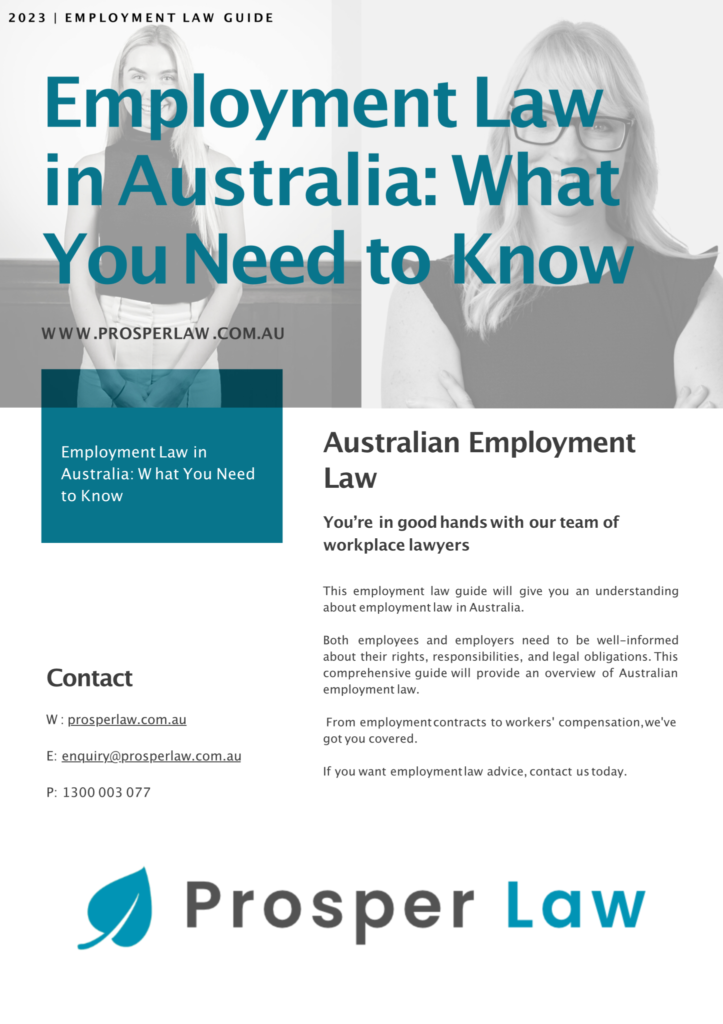Most employers know their business can be fined for breaches of employment law. What’s less understood is that individuals inside the business, including HR managers, payroll officers, directors, even line managers, can also face personal liability.
For employers, this means your HR and management team could face serious legal consequences if they knowingly assist or ignore unlawful practices.
This article, by our employer lawyers explains how accessorial liability works, why it matters, and how employers can protect both their business and their people.
Key Takeaways
Accessorial liability extends beyond the employer entity and employees can be personally responsible for breaches.
If an individual knows (or ought to know) about the breach and helps it happen, they are exposed.
High-risk roles include HR managers, payroll officers, and directors, who are often directly involved in decision-making.
Individuals may face significant civil penalties, reputational harm, and career consequences.
Employers must train staff, review systems, and seek legal advice to minimise risks.

What is Accessorial Liability?
Section 550 of the Fair Work Act 2009 (Cth) allows courts to hold a person responsible if they are “involved in” a contravention of workplace laws.
An individual may be “involved in” a breach if they:
Aided, abetted, counselled, or procured the contravention.
Induced or attempted to induce the contravention.
Were knowingly concerned in or party to the contravention.
Conspired with others to bring about the contravention.
In plain terms, if someone knows about unlawful conduct (such as underpaying employees, denying leave entitlements, or engaging in sham contracting) and they assist in carrying it out (even passively), they may be held personally liable.
Why Accessorial Liability Matters for Employers and HR
Employment law is complex. Awards, enterprise agreements, and statutory entitlements often overlap, and mistakes can happen. But when breaches are ignored, repeated, or deliberate, accessorial liability exposes both individuals and businesses to serious consequences.
Here’s why it matters:
1. Risk to Your Staff: HR and payroll professionals are often tasked with carrying out decisions on pay and entitlements. If those decisions are unlawful, they can be personally targeted by regulators. This creates stress, reputational harm, and career risks – and can damage morale and retention.
2. Reputation and Compliance Costs: When individuals are named in enforcement action, the business is also seen as non-compliant. Media coverage, regulator scrutiny, and ongoing audits can quickly erode trust with employees, clients, and investors.
3. Regulator Focus on Individuals: The Fair Work Ombudsman has made it clear: they will pursue individuals as well as companies. HR managers, payroll officers, and directors are increasingly in the spotlight.
4. Financial Fallout: Penalties aren’t just fines. Legal costs, back-payments, and administrative disruption all add up. For individuals, fines are personal – companies cannot indemnify them.
5. Culture and Trust: If staff believe managers knowingly allow unlawful practices, trust breaks down. This can fuel complaints, whistleblowing, and union action – all of which are difficult to reverse.
6. Board and Executive Accountability: Liability doesn’t stop at HR. Directors who fail to ensure compliance may also be held responsible. Today, good governance means more than financial oversight – it means employment law compliance.
Ensure your HR practices are fully aligned with current Australian workplace laws – our resource, The Fair Work Act: A Guide for Employers, digs into key employer responsibilities
The Penalties: What’s at Stake?
Civil Penalties for Individuals
As of early 2025, individuals found liable can face civil fines up to $19,800 per contravention, with “serious contraventions” carrying penalties up to $198,000 per breach.
Criminal Offences for Intentional Wage Theft
Since 1 January 2025, intentional underpayment of workers is now a criminal offence. Individuals convicted under these wage-theft provisions may face up to 10 years’ imprisonment and/or fines of up to $1.65 million, or three times the amount of the underpayment – whichever is greater.
Career Impact
A finding of personal liability, or worse, criminal conviction, can significantly damage professional reputation and employability. The long-term effects on leadership credibility and career prospects are significant.
Stress, Costs & Business Disruption
Defending accessorial claims isn’t cheap. Costs include:
Legal fees
Time spent away from core roles
Administrative disruption
Reputational damage for both the individual and the business
These burdens often far exceed any penalty amount. And, critically, individuals cannot be indemnified by their employer for civil or criminal penalties, meaning fines come from their own pockets.
Real-Life Examples of Accessorial Liability
New Shanghai Charlestown (2017)
A restaurant chain underpaid 85 workers more than $580,000. The Federal Court fined not just the company, but also the director, HR manager, and store manager. Why? They helped create false records and knew staff were being underpaid. Penalties ranged from $18,000 to over $54,000 for these individuals.
Blue Impression & Ezy Accounting (2017)
A Japanese fast-food business underpaid a worker and ignored award loadings/allowances. The Court found the external accounting firm (Ezy Accounting 123) was accessorily liable – highlighting that advisers who are wilfully blind to underpayments can be on the hook too.
Penalties in the matter totalled $169,586.25, including $53,880 against the accounting firm.
Mullan v Dampier Salt & Rio Tinto (2024)
An employee alleged he was dismissed in breach of the general protections provisions. While Dampier Salt was his direct employer, the employee also sought to join Rio Tinto Ltd (the parent company) as a respondent, arguing it was “involved in” the contravention under s.550 of the Fair Work Act.
The Fair Work Commission allowed Rio Tinto to be added as a party (even though it was not the direct employer) highlighting that parent companies and affiliates can face accessorial liability if they are involved in workplace breaches.
Key lesson for employers: Liability risk is not confined to the employing entity. Parent companies, subsidiaries, and associated entities may all be drawn into disputes.
Taprell v Boyle & Bouris (2023)
A casual cook at Kingscliff Takeaway claimed she was dismissed unlawfully after raising concerns about underpayments and unpaid superannuation. She brought her case not just against the business owner (Mr Boyle) but also against her supervisor, Ms Bouris, alleging she was personally liable under s.550 of the Fair Work Act.
The employer argued she had abandoned her job, but the Commission found she was indeed dismissed at the employer’s initiative. Importantly, the claim sought to hold a non-owner supervisor personally responsible for breaches, showing how accessorial liability can extend to staff outside of ownership or director roles.
Key lesson for employers and HR: Even supervisors in small businesses can face accessorial liability if they are knowingly involved in underpayments or other breaches. Employers must ensure managers are trained and supported to handle employee entitlements lawfully.
Practical Checklist for Employers
To reduce the risk of accessorial liability, employers should take proactive steps. Here’s a practical checklist:
- Review employment contracts and policies regularly to ensure they comply with the Fair Work Act and awards.
- Train HR managers, payroll staff, and supervisors on accessorial liability risks.
- Conduct wage and compliance audits to detect underpayments early.
- Establish reporting mechanisms so staff can escalate concerns safely without fear of reprisal.
- Seek independent legal advice before implementing changes that affect employee entitlements.
- Document compliance efforts (such as training records, audit outcomes, and legal advice) to demonstrate due diligence.
- Act quickly on suspected breaches to correct mistakes before regulators intervene.
Ensure legal precision from day one by choosing a contract drafted by a lawyer, not AI-generated templates – see why it matters in our article Why Employment Contracts Should Be Drafted by Lawyers – Not Artificial Intelligence.

Frequently Asked Questions (FAQs)
Who can be held personally liable under accessorial liability?
Anyone “involved” in a breach (including directors, HR managers, payroll officers, supervisors, and even advisers) who knowingly assist. It’s not limited to top executives; courts look at day-to-day involvement and influence.
Unsure where the risk lies in your business? Prosper Law’s employment lawyers can review your roles and compliance practices.
Does an individual have to benefit financially to be liable?
No. Liability is based on knowledge and involvement, not profit. A payroll officer who knowingly processes underpayments, or a director who approves sham contracting, may be liable even if they don’t personally gain.
Can staff be liable even if they were following instructions?
Yes. “Just following orders” is not a defence. If staff know a decision is unlawful and carry it out anyway, they may be personally liable. This is a real challenge for HR and payroll staff under pressure from management.
What role does knowledge play?
Knowledge is key. Courts are likely to assess whether an individual knew (or should have known) about the breach. Turning a blind eye or ignoring warning signs can still result in liability.
How can employers protect their HR and payroll staff?
Employers should:
Provide regular training.
Run compliance audits.
Offer safe reporting channels.
Seek legal advice before major changes.
Keep strong compliance records.
These steps protect both the business and individuals from liability.
Prosper Law’s employment lawyers can design compliance frameworks tailored to your workplace. Contact our employment law team today.




